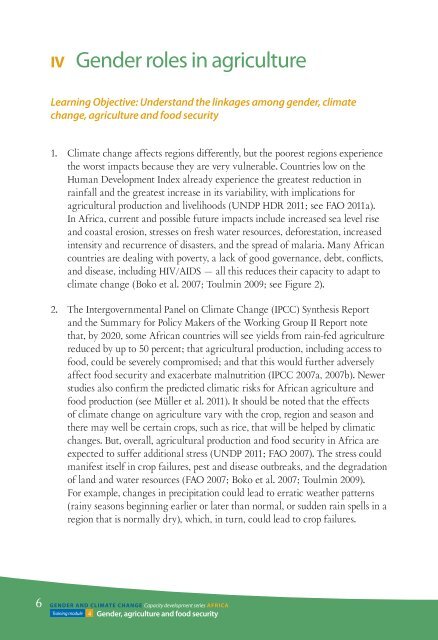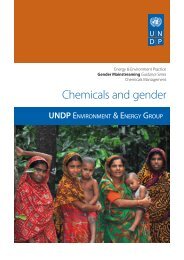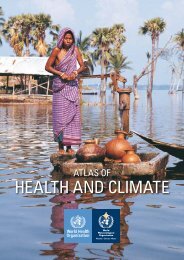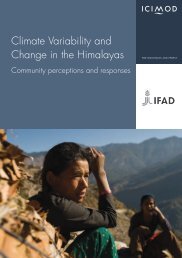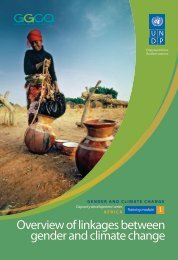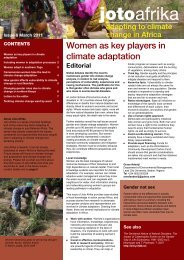Module 4: Gender, Agriculture and Food Security - Gender Climate
Module 4: Gender, Agriculture and Food Security - Gender Climate
Module 4: Gender, Agriculture and Food Security - Gender Climate
- No tags were found...
Create successful ePaper yourself
Turn your PDF publications into a flip-book with our unique Google optimized e-Paper software.
IV <strong>Gender</strong> roles in agriculture<br />
Learning Objective: Underst<strong>and</strong> the linkages among gender, climate<br />
change, agriculture <strong>and</strong> food security<br />
1. <strong>Climate</strong> change affects regions differently, but the poorest regions experience<br />
the worst impacts because they are very vulnerable. Countries low on the<br />
Human Development Index already experience the greatest reduction in<br />
rainfall <strong>and</strong> the greatest increase in its variability, with implications for<br />
agricultural production <strong>and</strong> livelihoods (UNDP HDR 2011; see FAO 2011a).<br />
In Africa, current <strong>and</strong> possible future impacts include increased sea level rise<br />
<strong>and</strong> coastal erosion, stresses on fresh water resources, deforestation, increased<br />
intensity <strong>and</strong> recurrence of disasters, <strong>and</strong> the spread of malaria. Many African<br />
countries are dealing with poverty, a lack of good governance, debt, conflicts,<br />
<strong>and</strong> disease, including HIV/AIDS — all this reduces their capacity to adapt to<br />
climate change (Boko et al. 2007; Toulmin 2009; see Figure 2).<br />
2. The Intergovernmental Panel on <strong>Climate</strong> Change (IPCC) Synthesis Report<br />
<strong>and</strong> the Summary for Policy Makers of the Working Group II Report note<br />
that, by 2020, some African countries will see yields from rain-fed agriculture<br />
reduced by up to 50 percent; that agricultural production, including access to<br />
food, could be severely compromised; <strong>and</strong> that this would further adversely<br />
affect food security <strong>and</strong> exacerbate malnutrition (IPCC 2007a, 2007b). Newer<br />
studies also confirm the predicted climatic risks for African agriculture <strong>and</strong><br />
food production (see Müller et al. 2011). It should be noted that the effects<br />
of climate change on agriculture vary with the crop, region <strong>and</strong> season <strong>and</strong><br />
there may well be certain crops, such as rice, that will be helped by climatic<br />
changes. But, overall, agricultural production <strong>and</strong> food security in Africa are<br />
expected to suffer additional stress (UNDP 2011; FAO 2007). The stress could<br />
manifest itself in crop failures, pest <strong>and</strong> disease outbreaks, <strong>and</strong> the degradation<br />
of l<strong>and</strong> <strong>and</strong> water resources (FAO 2007; Boko et al. 2007; Toulmin 2009).<br />
For example, changes in precipitation could lead to erratic weather patterns<br />
(rainy seasons beginning earlier or later than normal, or sudden rain spells in a<br />
region that is normally dry), which, in turn, could lead to crop failures.<br />
6<br />
<strong>Gender</strong> <strong>and</strong> <strong>Climate</strong> Change Capacity development series Afric a<br />
Training module 4 <strong>Gender</strong>, agriculture <strong>and</strong> food security


